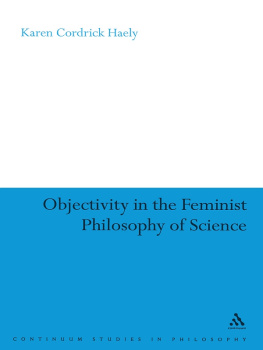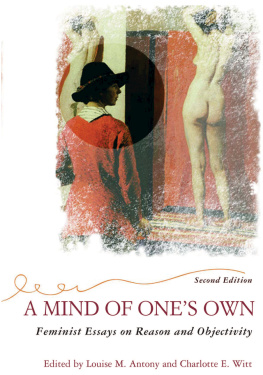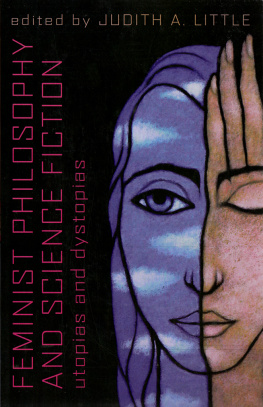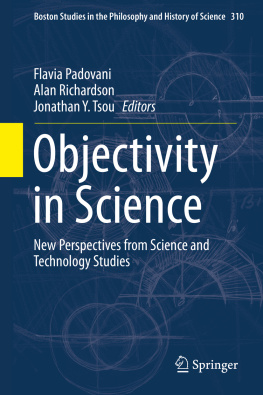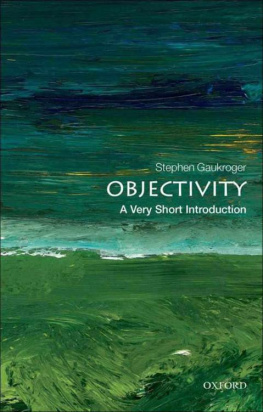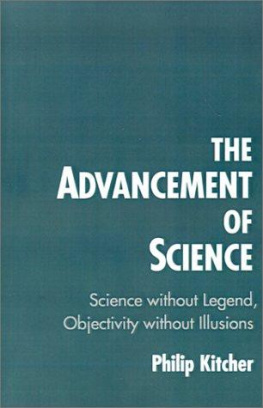Haely - Objectivity in the Feminist Philosophy of Science
Here you can read online Haely - Objectivity in the Feminist Philosophy of Science full text of the book (entire story) in english for free. Download pdf and epub, get meaning, cover and reviews about this ebook. City: London;New York, year: 2008;2011, publisher: Bloomsbury Publishing Plc;Continuum, genre: Science. Description of the work, (preface) as well as reviews are available. Best literature library LitArk.com created for fans of good reading and offers a wide selection of genres:
Romance novel
Science fiction
Adventure
Detective
Science
History
Home and family
Prose
Art
Politics
Computer
Non-fiction
Religion
Business
Children
Humor
Choose a favorite category and find really read worthwhile books. Enjoy immersion in the world of imagination, feel the emotions of the characters or learn something new for yourself, make an fascinating discovery.
- Book:Objectivity in the Feminist Philosophy of Science
- Author:
- Publisher:Bloomsbury Publishing Plc;Continuum
- Genre:
- Year:2008;2011
- City:London;New York
- Rating:5 / 5
- Favourites:Add to favourites
- Your mark:
- 100
- 1
- 2
- 3
- 4
- 5
Objectivity in the Feminist Philosophy of Science: summary, description and annotation
We offer to read an annotation, description, summary or preface (depends on what the author of the book "Objectivity in the Feminist Philosophy of Science" wrote himself). If you haven't found the necessary information about the book — write in the comments, we will try to find it.
Haely: author's other books
Who wrote Objectivity in the Feminist Philosophy of Science? Find out the surname, the name of the author of the book and a list of all author's works by series.
Objectivity in the Feminist Philosophy of Science — read online for free the complete book (whole text) full work
Below is the text of the book, divided by pages. System saving the place of the last page read, allows you to conveniently read the book "Objectivity in the Feminist Philosophy of Science" online for free, without having to search again every time where you left off. Put a bookmark, and you can go to the page where you finished reading at any time.
Font size:
Interval:
Bookmark:
PHILOSOPHY OF SCIENCE
Continuum Studies in Philosophy
Series Editor: James Fieser, University of Tennessee at Martin, USA
Continuum Studies in Philosophy is a major monograph series from Continuum. The series features first-class scholarly research monographs across the whole field of philosophy. Each work makes a major contribution to the field of philosophical research.
Aesthetic in Kant, James Kirwan
Analytic Philosophy: The History of an Illusion, Aaron Preston
Aquinas and the Ship of Theseus, Christopher Brown
The Challenge of Relativism, Patrick Phillips
Demands of Taste in Kants Aesthetics, Brent Kalar
Descartes and the Metaphysics of Human Nature, Justin Skirry
Descartes Theory of Ideas, David Clemenson
Dialectic of Romanticism, Peter Murphy and David Roberts
Hegel's Philosophy of Language, Jim Vernon
Hegel's Philosophy of Right, David James
The History of Intentionality, Ryan Hickerson
Kierkegaard's Analysis of Radical Evil, David A. Roberts
Leibniz Reinterpreted, Lloyd Strickland
Metaphysics and the End of Philosophy, H.O. Mounce
Nietzsche and the Greeks, Dale Wilkerson
Origins of Analytic Philosophy, Delbert Reed
Philosophy of Miracles, David Corner
Platonism, Music and the Listener's Share, Christopher Norris
Popper's Theory of Science, Carlos Garcia
Role of God in Spinoza's Metaphysics, Sherry Deveaux
Rousseau and the Ethics of Virtue, James Delaney
Rousseau's Theory ofFreedom, Matthew Simpson
Spinoza and the Stoics, Firmin DeBrabander
Spinoza's Radical Cartesian Mind, Tammy Nyden-Bullock
St. Augustine and the Theory of Just War, John Mark Mattox
St. Augustine of Hippo, R.W. Dyson
Thomas Aquinas & and John Duns Scotus, Alex Hall
Tolerance and the Ethical Life, Andrew Fiala
PHILOSOPHY OF SCIENCE
Karen Gordrick Haely

Continuum International Publishing Group The Tower Building, 11 York Road, London SEI 7NX 80 Maiden Lane, Suite 704, New York, NY 10038
www.continuumbooks.com
Karen Cordrick Haely 2008
All rights reserved. No part of this publication may be reproduced or transmitted in any form or by any means, electronic or mechanical, including photocopying, recording, or any information storage or retrieval system, without prior permission in writing from the publishers.
British Library Cataloguing-in-Publication Data
A catalogue record for this book is available from the British Library.
ISBN-10: HB: 0-8264-9954-6
ISBN-13: HB: 978-0-8264-9954-7
Library of Congress Cataloging-in-Publication Data
Haely, Karen Cordrick.
Objectivity in the feminist philosophy of science/Karen Cordrick Haely.
p. cm.
ISBN 978-0-8264-9954-7
1. Science-Philosophy. 2. Feminist criticism. I. Title.
Q175.H216 2008
501-dc22 2007036223
I wish to thank Louise M. Antony for sharing her philosophical insight and helpful critique that made this project possible, as well as for her patience in correcting both my stylistic and philosophical errors. I also wish to thank Don Hubin and George Pappas for their suggestions and guidance, especially in the earliest stages of this project when it was at its worst, and Robert Kraut for cultivating my interest in Quine. I am also grateful to Hank Kreuzman who has given me philosophical guidance and critique for nearly two decades. Finally, I wish to thank Ryan, Kevin, my parents, Jeff and other family and friends who have encouraged and supported my efforts to complete this project.
This text presents analyses of some of the more prominent feminist views of scientific objectivity, which largely stem from positions of critique of the philosophy and practice of science. I will spend considerable time explicating the critiques themselves, the reasons for the critiques, and reasons why the critiques might be compelling. But ultimately, I will suggest that taken individually these views offering useful ways to think about objectivity in science, and how to maximize it, aren't nearly as useful as they are taken collectively.
That is, sometimes in looking for the one view that is most useful, or most comprehensive, we neglect the network of views that can give us clues as to what we ought to think about a given philosophical problem. This network for which I have no technical definition or grandiose programme is simply a set of ideas or best practices that helps rather than hinders our ideas about a particular issue or problem, in this case scientific objectivity.
Here Fll be tackling the issue of objectivity in science as seen from feminist perspectives. This is done not to suggest that other, nonfeminist views of objectivity aren't of philosophical interest, but rather to narrow the focus of a field that is vast. In addition, the feminist critiques of science have recently come under some fire for being social constructive in nature, or for being overly cynical about what scientists are really up to, or for themselves being overtly political.accusation that has been launched at feminist critics of science). Rather, views arise from their feminist perspectives that are of philosophical and, I'll suggest, practical value.
Much can be learned by examining the views of feminists who address the notion of objectivity to make feminist-oriented points about knowledge, and in particular, scientific knowledge. In the chapters that follow, I will examine some prominent feminist theories about objectivity and intend to piece together a network of ideas that assist us in: (a) shedding light on just how complex this concept is; (b) developing a clearer understanding of current feminist ideas about objectivity; and (c) showing why many feminists, including myself, still think that some kind of objectivity is necessary for the success of science. In general, the views examined in this text offer conceptions of objectivity that are intended to allow us to increase the extent to which our scientific theories are objective, but at the same time allow us to appreciate (and not eliminate) the role of cultural and personal interests and values as they play a role in science.
In , I outline some philosophical views that serve as a foundation or starting place for many of the late-twentieth-century feminist critiques of science, namely from Kuhn and Quine. I believe it makes sense to place the discussions of the objectivity or subjectivity of science into a historical context, as it will become clear to the reader that the feminist critics of science were not the first to wonder about the extent to which the scientific method really provides us with a reliable way to churn out objective knowledge, though they were the first to seriously consider the effect of gender both the gender of the actual scientists and cultural beliefs about gender on what we call science. As well, Quine's arguments about viewing knowledge as a network of beliefs laid a foundation for my own view, which is that collectively, the various suggestions feminists have given us about enriching the concept of objectivity provide a valuable part of that network of knowledge.
In find the truth. So, under the broader sense of science a structured, systematic inquiry MacKinnon's views are certainly useful. Her views about objectivity focus on the extent to which political or social power can play a role in what we call objective. Her observations about the role of power in creating knowledge serve to underscore once again why feminists are interested in objectivity in the first place. Though MacKinnon does not focus on the objectivity of science, her worries about the role of power in forming knowledge serve as an appropriate warning for feminists who are working to construct conceptions of scientific objectivity. I'll also suggest that the conception of objectivity ought to be restructured and enriched, and that feminists should resist the temptation to give up on objectivity in scientific inquiry altogether, which MacKinnon sometimes talks of doing.
Font size:
Interval:
Bookmark:
Similar books «Objectivity in the Feminist Philosophy of Science»
Look at similar books to Objectivity in the Feminist Philosophy of Science. We have selected literature similar in name and meaning in the hope of providing readers with more options to find new, interesting, not yet read works.
Discussion, reviews of the book Objectivity in the Feminist Philosophy of Science and just readers' own opinions. Leave your comments, write what you think about the work, its meaning or the main characters. Specify what exactly you liked and what you didn't like, and why you think so.

